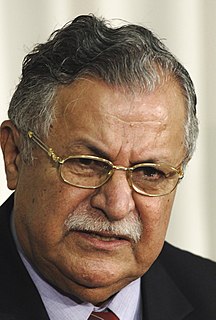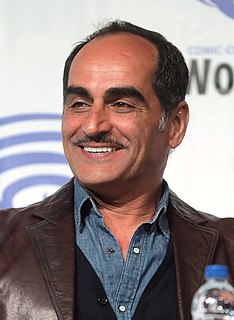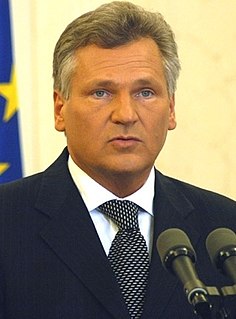A Quote by Jalal Talabani
It was an agreement between Saddam (Hussein) and the shah of Iran and not between Iraq and Iran.
Related Quotes
Americans have eliminated Iran's worst enemies, the Taliban in Afghanistan and Saddam [Hussein]. I occasionally threatened my Iranian counterpart in Kabul that one day I would send him a big bill for what we did. But, seriously, Iran is pursuing a dual strategy in Iraq. On the one hand, the Iranians, after decades of hostility, are now interested in good relations. On the other hand, they want to keep the country weak and dominate the region.
The administration took care of a source of instability in Iraq. Envision a world in which Saddam Hussein was rushing for a nuclear weapon to compete against Iran. My decision to remove Saddam Hussein was the correct decision in my judgment. We didn't find the weapons we thought we would find or the weapons everybody thought he had. But he was a significant source of instability.
Congress has a limited role in regards to the nuclear agreement with Iran. We do have a review statute that was enacted into law where we review Iran's compliance with the agreement, and we have certain requirements on the President to keep us informed. What we have seen so far is that Iran is in compliance with the nuclear part of the agreement, but certainly has violated non-nuclear issues.
The Iranians are Moslems and the Iraqi are Moslems. Both are certain that there is no God but Allah and that Mohammed is his prophet and believe it with all their hearts. And yet, at the moment, Iraq doesn't trust Iran worth a damn, and Iran trusts Iraq even less than that. In fact, Iran is convinced that Iraq is in the pay of the Great Satan (that's God-fearing America, in case you've forgotten) and Iraq counters with the accusation that it is Iran who is in the pay of the Great Satan. Neither side is accusing the Godless Soviets of anything, which is a puzzle
By accident of geography, the world's major oil resources are in Shi'ite-dominated areas. Iran's oil is concentrated right near the gulf, which happens to be an Arab area, not Persian. Khuzestan is Arab, has been loyal to Iran, fought with Iran not Iraq during the Iran-Iraq war. This is a potential source of dissension. I would be amazed if there isn't an attempt going on to stir up secessionist elements in Khuzestan.
My advice for Obama concerning Iran is just to do what you already promised you would do, open up communications with Iran. Which is what I did after the Shah was deposed, as you know when the revolutionary government came in, I still had diplomatic relations with Iran, otherwise the hostages wouldn't have been there. We had about, as you know, 60 some diplomats in Iran, they had about the same number in Washington.


































